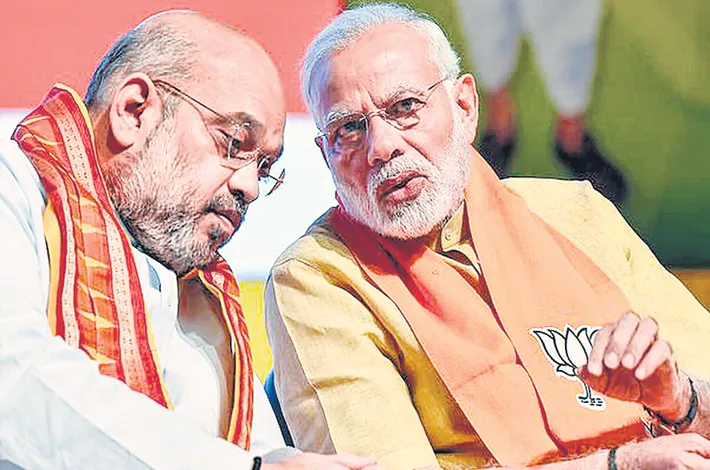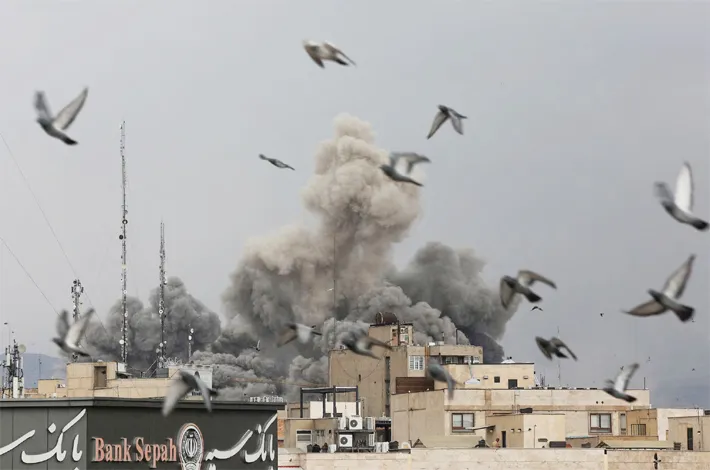Democracy @ Crossroads?
21-08-2025 12:03:34 AM

Controversial 130th constitutional amendment bill ignites fierce debate in LS
On Wednesday, the Lok Sabha descended into chaos as Union Home Minister Amit Shah introduced the Constitution (130th Amendment) Bill, alongside the Jammu and Kashmir Reorganisation (Amendment) Bill and the Government of Union Territories (Amendment) Bill. These bills propose a radical legal framework for the automatic removal of elected officials, including the Prime Minister, Chief Ministers, and Ministers, detained in police custody or jailed for 30 consecutive days on serious criminal charges punishable by five years or more.
The move, aimed at addressing perceived gaps in constitutional accountability, has sparked intense controversy, with the opposition accusing the government of undermining democracy, federalism, and due process. This analysis delves into the provisions of the bills, the opposition’s resistance, the government’s defense, and the broader implications for India’s political landscape.
The Bill
The Constitution (130th Amendment) Bill seeks to amend Articles 75, 164, and 239AA of the Constitution to establish a mechanism for removing elected officials detained for 30 days on charges carrying a minimum five-year sentence. Unlike existing laws, which require conviction for disqualification, these bills mandate removal based solely on prolonged detention, without necessitating a court conviction. The provisions extend to Union Ministers, the Prime Minister, Chief Ministers, and state or Union Territory Ministers, including those in Jammu and Kashmir and Delhi. If the Prime Minister or Chief Minister fails to act within 31 days of detention, the detained official is automatically removed. Notably, the bills allow reappointment upon release from custody, a clause the government highlights as a safeguard for those later cleared of charges.
The government’s rationale, as articulated by Amit Shah, emphasizes “constitutional morality” and public trust. The bills’ Statement of Objects and Reasons argues that elected representatives must uphold impeccable ethical standards, and prolonged detention on serious charges risks eroding public confidence and governance principles. The legislation draws inspiration from cases like former Delhi Chief Minister Arvind Kejriwal, who ran his government from jail for nearly six months in the Delhi excise policy case, and Tamil Nadu Minister Senthil Balaji, who remained in office despite arrest. The government contends that such scenarios undermine the sanctity of public institutions, necessitating a legal mechanism to ensure accountability.
Opposition’s Outcry: A Threat to Democracy
The introduction of the bills triggered an uproar in the Lok Sabha, with opposition MPs tearing copies of the legislation and staging protests, leading to the session’s adjournment. The opposition, led by figures like AIMIM MP Asaduddin Owaisi, Congress MP Manish Tewari, and West Bengal Chief Minister Mamata Banerjee, has fiercely criticized the bills as an assault on India’s democratic and federal structure. Owaisi argued that the bills empower executive agencies like the ED and CBI to act as “judge, jury, and executioner” by enabling removals based on mere allegations, violating the principle of separation of powers and due process. He warned that the amendments could transform India into a “police state,” where opposition leaders are targeted through arbitrary arrests.
Manish Tewari labelled the bills “squarely destructive” to the Constitution’s basic structure, emphasizing that they invert the fundamental legal principle of “innocent until proven guilty.” He highlighted the risk of executive overreach, where central agencies could detain opposition leaders for 30 days to destabilize non-BJP state governments without judicial oversight. Mamata Banerjee, in a scathing post on X, called the bills a “draconian step” and a “super emergency,” accusing the government of stripping judicial powers and undermining federalism.
She likened the move to authoritarian regimes, warning that it could “end the democratic era of India forever.” Other opposition voices, including CPI(M)’s John Brittas and RJD’s Manoj Jha, echoed these concerns, alleging that the bills are designed to weaponize central agencies against opposition-led states. Brittas described them as a tool to “destabilize opposition governments,” while Jha called them a “tactic” to bypass electoral defeats through legal means. Procedural objections were also raised, with RSP MP NK Premchandran noting that the bills were circulated to MPs only after 1:00 PM on August 19, leaving inadequate time for review.
Government’s Defense
In response, Amit Shah defended the bills as essential for upholding ethical governance, citing his own resignation as Gujarat’s Home Minister during past allegations as a precedent. He argued that the legislation ensures accountability for those in high office, regardless of political affiliation, and dismissed opposition protests as attempts to shield corrupt practices. BJP spokesperson Ajay Alok reinforced this stance, stating, “If the government changes, this bill will apply to us too,” emphasizing its non-partisan intent. Shah also addressed procedural concerns by proposing to refer the bills to a Joint Parliamentary Committee (JPC) comprising 21 Lok Sabha and 10 Rajya Sabha members for thorough scrutiny, signaling openness to consultation.
The government frames the bills as a response to public demand for cleaner politics, arguing that prolonged detention of elected officials risks undermining constitutional trust. Supporters point to judicial activism, such as Supreme Court rulings urging tainted ministers to resign, as aligning with the bills’ objectives. However, the rushed introduction, with limited prior circulation, has fueled opposition claims of procedural impropriety.
Broader implications
The 130th Constitutional Amendment Bill and its companion legislations raise profound questions about India’s democratic framework. Proponents view them as a bold step toward ethical governance, addressing loopholes that allow accused leaders to cling to power. Critics, however, see a dangerous precedent that could enable the central government to destabilize opposition-led states through selective enforcement by agencies like the ED and CBI, which the Supreme Court has previously criticized as “caged parrots.” The bills’ reliance on detention without conviction challenges the principle of due process, potentially allowing executive overreach to override judicial scrutiny.
The opposition’s allegations gain traction in the context of recent political controversies, such as Rahul Gandhi’s “Vote Adhikar Yatra” and accusations of electoral manipulation in Bihar’s Special Intensive Revision (SIR) process.
Some, like journalist@mkvenu1 on X, view the bills as a distraction from these issues, accusing the government of deploying its “typical playbook” to divert attention. This perception underscores the deepening polarization in Indian politics, where legislative moves are increasingly viewed through a partisan lens.
The referral to a JPC offers a chance for broader consultation, but the opposition’s distrust of the process, coupled with the bills’ far-reaching implications, suggests that the debate is far from over. Public opinion remains divided, with some welcoming the push for accountability and others fearing it could weaponize arrests against political rivals. As the JPC deliberates, the outcome will shape not only India’s governance standards but also the delicate balance of federalism, democracy, and judicial independence.
The 130th Constitutional Amendment Bill has ignited a firestorm in Indian politics, exposing fault lines between accountability and authoritarianism. While the government champions it as a reform for cleaner politics, the opposition’s warnings of a “super emergency” highlight the risks to India’s democratic fabric. The JPC’s review will be critical in determining whether these bills strengthen governance or pave the way for a more centralized, executive-driven polity.








